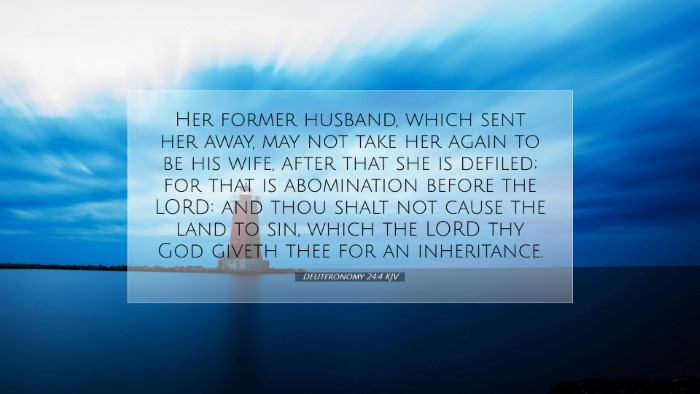Commentary on Deuteronomy 24:4
Verse: "Her former husband, which sent her away, may not take her again to be his wife, after that she is defiled; for that is abomination before the LORD: and thou shalt not cause the land to sin, which the LORD thy God giveth thee for an inheritance." (Deuteronomy 24:4)
Introduction
The verse in question falls within a larger context of laws provided to the Israelites as they prepare to enter the Promised Land. Within these laws, God sets forth principles that govern social justice, family, and worship. Deuteronomy 24:4 specifically addresses marriage and divorce, illustrating the serious relational and social implications of these practices.
Contextual Background
In the preceding verses, Moses articulates laws concerning divorce and remarriage. The scriptural context suggests a concern for stability within families and the community, resisting practices that could lead to moral corruption. Deuteronomy is part of the Pentateuch, and its legal stipulations were designed for a people who were transitioning to a new societal structure.
Commentary Insights
Matthew Henry's Commentary
Matthew Henry highlights the essence of marriage as a covenant reflecting God's commitment to His people. He emphasizes that once a woman is divorced and later defiled, it creates an irreparable breach in the sanctity of marriage. Henry notes that God disallows the remarriage of a divorced couple, viewing it as an abomination due to its inherent disloyalty and dishonor to the marital covenant.
Albert Barnes' Notes
Barnes elaborates on the concept of "defilement" as a significant moral and social issue. He points out that the command serves to protect both the woman and the integrity of marriage itself. The restriction placed on the former husband, preventing him from remarrying the woman after her defilement, serves a dual purpose: it maintains societal order and upholds divine standards of purity. Furthermore, Barnes notes that such practices could lead to widespread sin, provoking God's judgment upon the land.
Adam Clarke's Commentary
Clarke offers a practical view, explaining how this prohibition aims to deter frivolous divorce practices which could devalue the institution of marriage. He reminds us that the law serves not just to dictate behavior but to foster an environment where the significance of the marital bond is respected and preserved. The law reflects God's desire for fidelity and the seriousness of marital vows, underscoring that, once broken, the innate sanctity of that relationship cannot be restored through the act of remarriage.
Theological Implications
The theological implications of Deuteronomy 24:4 extend beyond mere legalistic interpretations. They emphasize the nature of God as a covenantal being, who values relationships based on commitment and faithfulness. The stricter regulations regarding remarriage seek to root the community in an understanding of love that reflects God's love for His people.
God's View of Marriage
Scripturally, marriage is portrayed as more than a contract; it is a divine covenant. The prohibition against remarrying a former spouse illustrates the irreversible nature of certain actions in the light of divine law. This mirrors Christ's teachings in the New Testament, where Jesus reiterates the sanctity of marriage (Matthew 19:9). It ultimately calls believers to reflect the fidelity of Christ in their own relationships.
The Impact of Sin
The verse implies a direct consequence of moral failure—both for the individual and the community. The "abomination" referenced speaks to the serious nature of sin in God's economy. It suggests that personal choices extend beyond personal ramifications, impacting the wider community and the land itself. Thus, there’s a call for vigilance in marital commitments.
Sociological Perspectives
From a sociological point of view, the preservation of marital integrity is essential in maintaining social structures. Divorce and remarriage can lead to broader societal issues, including fragmented families and community instability. The law stands as a guardrail to nurture societal health and familial well-being through clearly defined boundaries.
Application for Today's Believers
In applying the teachings of Deuteronomy 24:4 today, believers are called to respect the sanctity of marriage as designed by God. This requires an intentional focus on commitment and accountability within marital relationships. Pastors and spiritual leaders can use this passage to guide counseling discussions around divorce, encouraging individuals to seek reconciliation and healing before resorting to separation.
Walking in Faithfulness
Furthermore, the call to faithfulness extends beyond marital relationships; it encompasses all commitments made in the name of the Lord. Christians are reminded of their covenant with God and are encouraged to live in a manner that reflects His steadfast love and faithfulness, not only in marriage but in all aspects of life.
Conclusion
Deuteronomy 24:4 provides a profound commentary on the nature of relationships, the sanctity of marriage, and the serious implications of moral choices within a community. Through the insights gleaned from public domain commentaries, we understand the depth of God’s design for marriage and the protective measures He instituted for His people. This passage is a call to reflect on our commitments, lean on divine grace for faithfulness, and uphold the dignity of the covenantal relationships we engage in.


